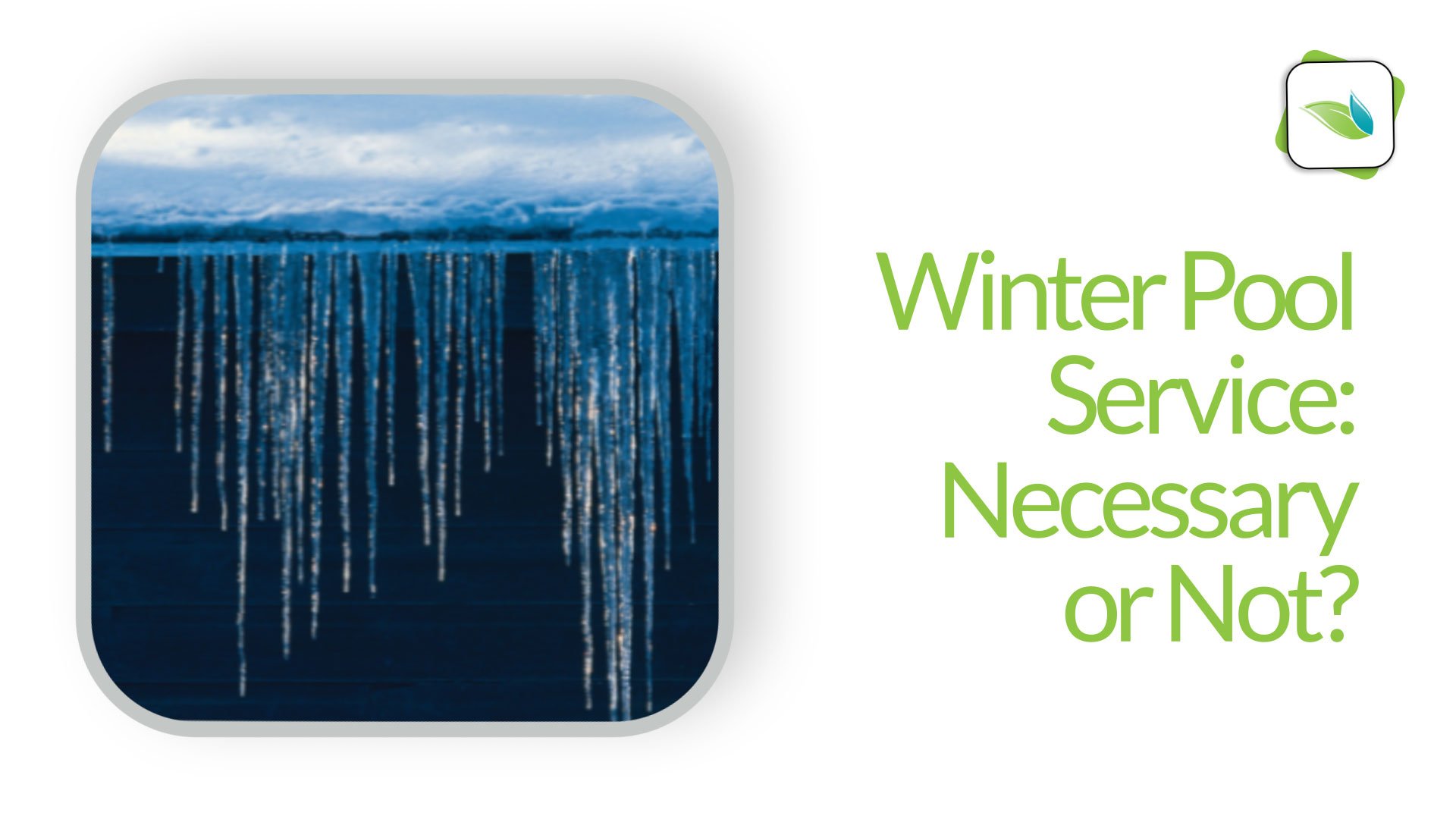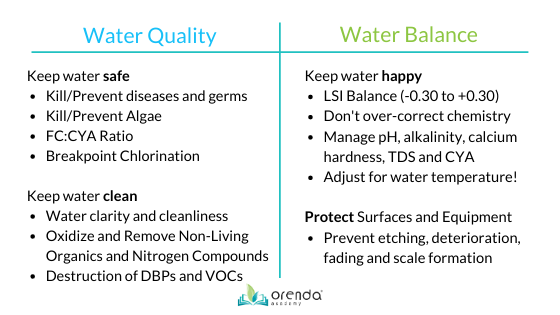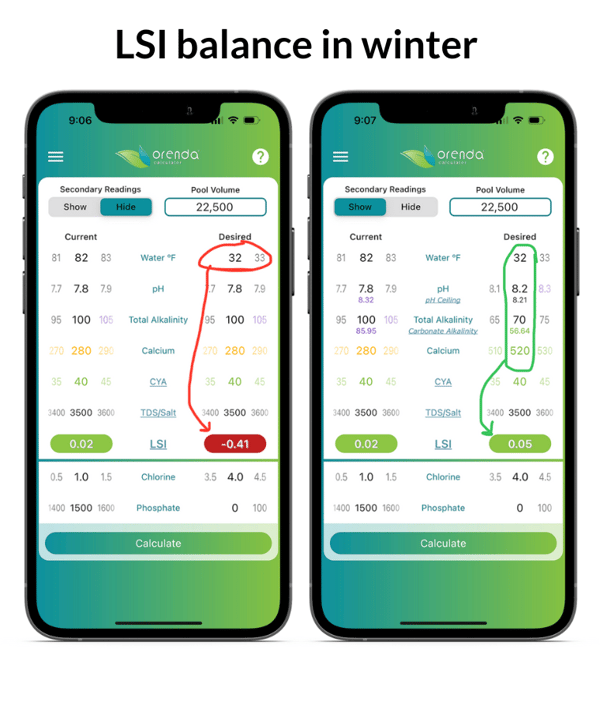Winter Pool Service: Necessary or Not?

There are few certainties in life: death, taxes, deadlines, and homeowners who want to suspend or cancel pool service during the winter. We understand the logic behind suspending pool service, but we also know that the logic is based on incomplete information. As pool professionals, it is our responsibility to inform customers–homeowners who ultimately make the final decisions about their pool–about what cold water can do to their pool over the winter.
Related: Cold Water and the LSI
This article is not only for pool professionals, but for pool owners too. So if you’re reading this, please share it with anyone who owns a swimming pool. If we as an industry can bring honest, valuable information to consumers, it helps everyone make better decisions about what to do with their pools. The challenge is, when the truth is not what the consumer wants to hear, too often pool professionals fear telling them the bad news. But no worries! We at Orenda have no fear of telling it like it is.
Winter is Coming...
With the exception of the initial fill and startup, the vast majority of damage to swimming pools occurs during the winter. And that’s when nobody is paying attention.
Orenda’s position on this is loud and clear: do not ignore your pool(s) in the off season. Whether your pool freezes or just gets down into the 50ºs or 60ºs, water temperature always matters. Apart from startup, winter is when most pool damage occurs.
You see, while water chemistry is a complex subject, there are basically two sides of it: water quality and balance.

Water quality is about sanitization and oxidation. It is keeping the water clean, clear, safe (sanitized), and algae-free. In the winter, sanitization is less of a concern because the water temperature makes it very difficult for contaminants like algae to reproduce. But dropping temperatures make an enormous impact on the other side, water balance. We measure water balance using the Langelier Saturation Index (LSI), and Orenda has a free app that calculates it for you, easily. Put in perfect water chemistry, then drop the temperature from the 80ºs down to the 30ºs or 40ºs. Our calculator will show a RED LSI value at the bottom, telling us the otherwise perfectly balanced water becomes aggressive in the winter. Aggressive water causes costly problems over the winter. Like calcite crystals, winter dust, and more.

Swimming Pool Off-Season
Look, we get it. Pool service makes a lot of sense when the weather is warm and people want to swim. Everyone wants to have a crystal clear pool that looks pristine during the summer months, and that justifies the cost of weekly pool maintenance. This makes sense, as it is easy for a homeowner to see a direct relationship between money being spent and the benefits they receive.
Pool service just doesn’t appear necessary when the water is cold (and perhaps covered for the winter), when nobody wants to swim. And why would it? Like we just mentioned, contaminants like algae do not reproduce and grow very well in cold water, so the water tends to look beautiful. Unless there is visible carbonate scale everywhere (which should never form during the winter), cold, aggressive water looks amazing. It looks crystal clear. And that’s the trap.
$ave that Money
If a customer is strictly looking at pool maintenance as an unnecessary cost in the off-season, then as a pool professional, you can do a better job clarifying exactly what they are spending their money on. Share the inconvenient truth about what’s really going on when the water gets cold.
Related: Proactive Pool Winterization to Prevent Problems
Rather than just associating pool service with water clarity, fun and happiness during the summer, it’s time to flip that narrative and cover the financial reasons for not ignoring the pool in the winter. That pool in the homeowner’s back yard is a massive investment worth protecting. Perhaps we can all agree that pools are not cheap, and are a significant amenity that boosts the home’s value. How do we protect the rest of our home from potential damage? We have insurance; do preventative maintenance; get our homes and roofs inspected after major storms; we water our lawns and flowers; we hire exterminators for pest control, etc..
Winter pool maintenance should be thought of in the same way–as an insurance plan. There is a continual need for it throughout the winter. Water chemistry is an ongoing, constantly changing thing. For instance, the pool can be perfectly clear all winter, but when the water warms up in the spring, it can start to turn green and calcium dust can fall out of solution, or crystals can form out of the surface.
So here's an idea. In cold climates, we have seen more and more service companies offer a “winter watch” program, which is a simplified service plan. Rather than the full-on regimen of cleaning and chlorination, etc., a winter watch program is basically testing the water chemistry and making adjustments to keep the LSI balanced as the temperatures get colder. It’s usually once or twice a month only, and the results have been very positive from what we have seen.
As an aside about water testing in winter, most test kits will be inaccurate with cold water. Collect a sample and warm up the sample before testing. We recommend water over 65º, though different manufacturers have a minimum of about 55º.
So yes, winter pool maintenance costs some money, but nothing compared to the costs of the problems cold water can cause. We have written articles about such problems with winterization, like calcite crystals, etching and equipment damage. Such issues can easily cost thousands of dollars to resolve. Remember…water caused those problems. Don’t ignore it.
Be Proactive with your Pool Chemistry
In conclusion, when homeowners suspend pool service over the winter to save money, it can end up causing costly damage to the pool itself. We understand the logic, but we hope this article emphasizes the inconvenient truth that cold water is more aggressive, and can damage pools in the winter. Even if you have a fiberglass or vinyl liner pool, the LSI matters. Those surfaces can fade deteriorate too.
So, to the pool professionals reading this, inform your customers of why winter water chemistry changes, and why maintaining a pool during the winter is important. At the very least, help the homeowner understand what’s at stake so they can make an informed decision. We hope this article helps you explain why it is so important.
If you have done your job and informed the homeowner, yet they still decide to cancel service for the winter, they have ultimately taken control and liability of whatever happens during the winter.
